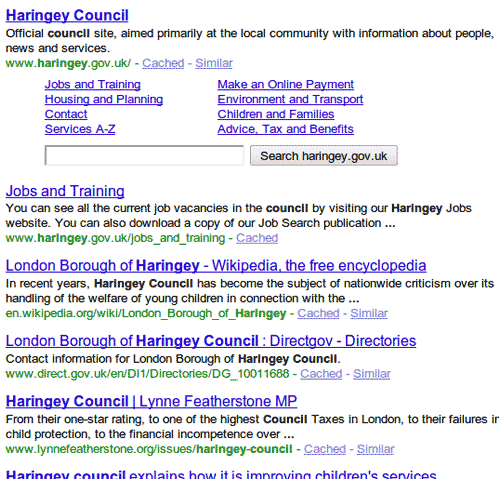I’ve mentioned this before, but it still brings a smile to my face.
One consequence of the rebuild of Lynne Featherstone MP’s website, which we launched last September, has been a marked improvement in Google performance. And it’s arguably my greatest personal triumph that if you search Google for ‘haringey council’ – the top suggested search query if you just type in ‘hari’ – here‘s what you (currently) get:

So the first five results on a standard Google results page are: two pages from the council itself – the council’s own homepage and one of its most popular individual pages (as you’d normally expect for such a targeted query); a page from Wikipedia; a page from Directgov; and at slot number 5, LibDem MP Lynne’s automated page detailing everything that’s wrong with the Labour-run council… with a particularly arresting excerpt.
SEO, or Search Engine Optimisation, isn’t something I typically find myself paying much (conscious) attention to. In my experience, it’s usually enough to have followed the basics of web page construction: and I’ve been coding HTML for 15 years now, so it’s all fairly instinctive. WordPress helps by encouraging you to use significant elements such as the page title – presumably including significant keywords – in both the HTML <title> and the page URL; plus there are a couple of plugins I tend to activate for all clients which help Google ranking, install instantly, and never trouble you again.
But because it’s baked into the process, albeit subconsciously, the results are there to be seen: and will come to the fore over the next few weeks.
Naturally, with an election imminent, MPs and candidates are looking for every possible opportunity to get their messages in front of voters and journalists. For zero extra effort, and at zero cost, we’re getting one of Lynne’s core messages in front of the tens of thousands of people searching for ‘haringey council’ each month. (According to Google’s Adwords keyword tool, 22,200 people searched for ‘haringey council’ in February 2010… far more than the 1,300 who searched for ‘lynne featherstone’ specifically.)
Lynne is defending a relatively modest majority of 2,395 – notionally putting her in Labour’s no39 target seat. We’ve had plenty of favourable feedback regarding her website already: Iain Dale, I’m reliably informed, called it one of the best political websites he’d ever seen. But it won’t surprise you to learn that we’re looking at a couple of possible enhancements for the election campaign period. Stay tuned.